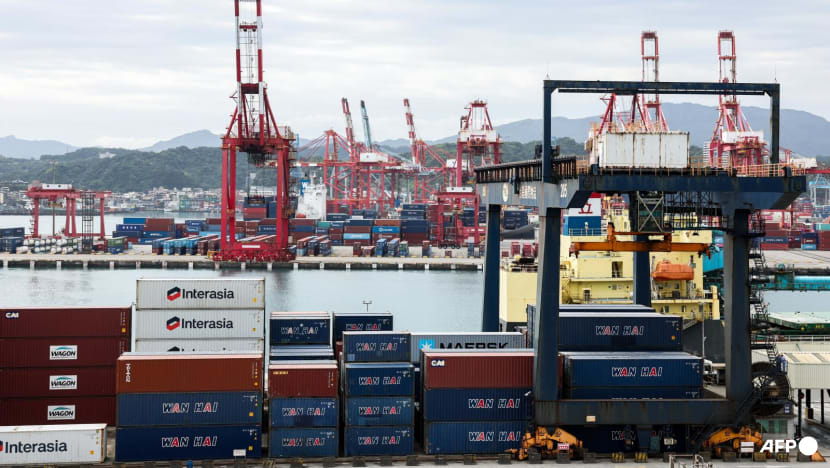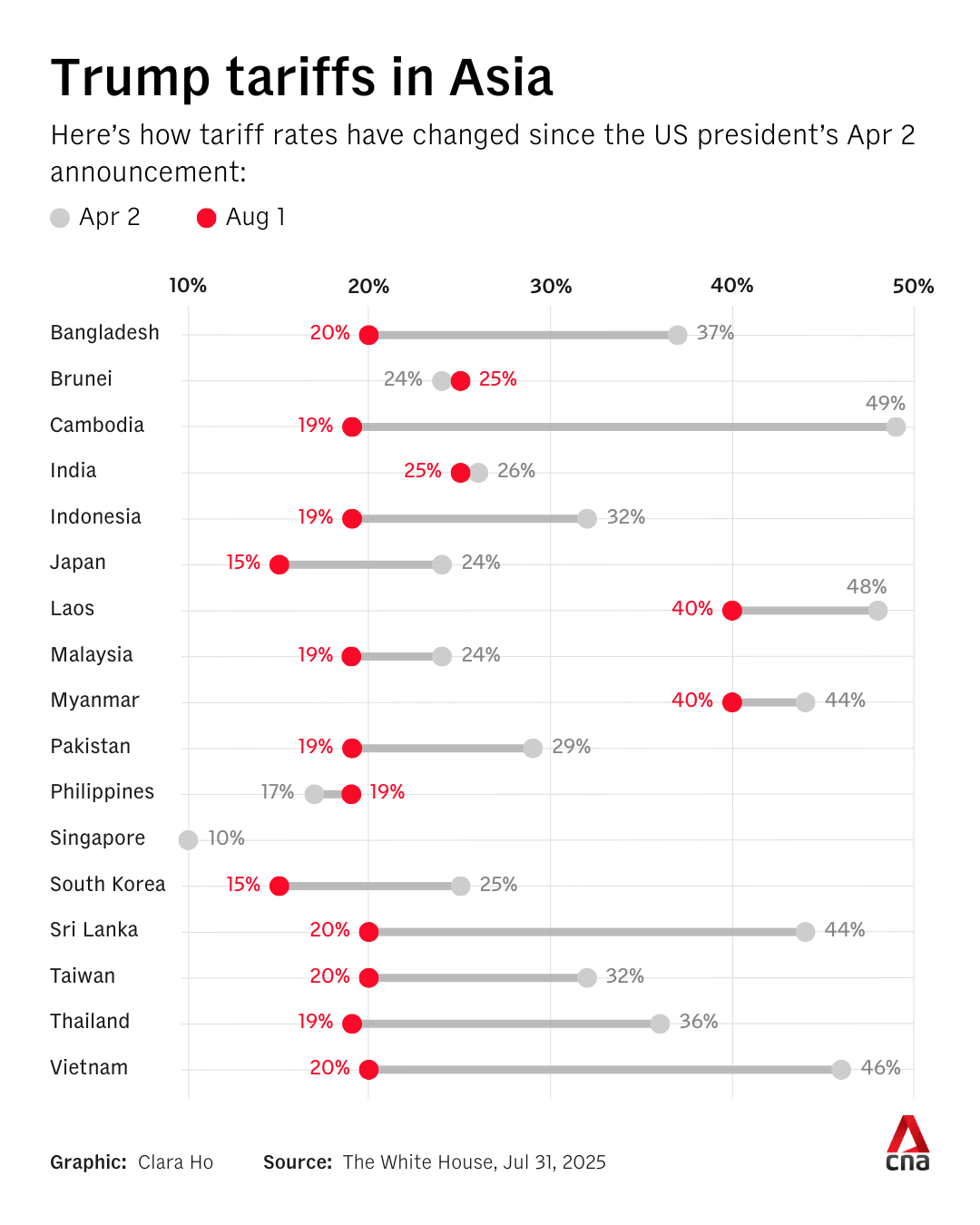Hours before trade deal deadline, Trump orders new tariffs for dozens of economies
Malaysia, Thailand and Cambodia now face a reduced tariff rate of 19 per cent.

Containers and cranes are seen at the Port of Keelung on Apr 3, 2025. (Photo: AFP/I-Hwa Cheng)
US President Donald Trump slapped dozens of trading partners with steep tariffs ahead of a Friday (Jul 31) trade deal deadline, including a 35 per cent duty on many goods from Canada, 50 per cent for Brazil, 25 per cent for India, 20 per cent for Taiwan and 39 per cent for Switzerland.
Trump released an executive order listing higher import duty rates of 10 per cent to 41 per cent starting in seven days for 69 trading partners as the 12.01am (4.01am GMT) deadline approached. Some of them had reached tariff-reducing deals, and some had no opportunity to negotiate with his administration.
The order said that goods from all other countries not listed in an annex would be subject to a 10 per cent US tariff rate. Levies on Singapore goods exported to the US are likely to remain at 10 per cent.
Malaysia now faces a 19 per cent tariff rate on its goods exported to the US, down from 25 per cent.
Cambodia and Thailand both saw a reduced tariff rate of 19 per cent from the previously threatened 36 per cent. The lowered rate comes after the two Southeast Asian nations agreed to an immediate and unconditional ceasefire after Trump had threatened not to make trade deals with either country if they continued fighting over a border dispute.
The Trump administration also teased that more trade deals were in the pipeline as it seeks to close trade deficits and boost domestic factories.
No final decision has been made on China, said a senior US official. US and Chinese officials on Jul 29 agreed to seek an extension of their 90-day tariff truce that is set to expire on Aug 12 – although Trump has yet to officially agree to the extension.
This time, markets had a more muted reaction. Stocks and equity futures fell modestly in Friday morning trading in Asia.
Trump's order said that some trading partners, "despite having engaged in negotiations, have offered terms that, in my judgment, do not sufficiently address imbalances in our trading relationship or have failed to align sufficiently with the United States on economic and national-security matters".
Other details are still to come, including on the "rules of origin" that will determine what products might face even higher tariffs.
Trump also said "we have made a few deals today that are excellent deals for the country", and a US official later told reporters that they were still to be announced.
CANADA, MEXICO
Trump issued a separate order for Canada that raises the rate on Canadian goods subject to fentanyl-related tariffs to 35 per cent from 25 per cent previously, saying Canada had "failed to cooperate" in curbing fentanyl flows into the US.
The higher tariffs on Canadian goods contrasted sharply with Trump's decision to grant Mexico a 90-day reprieve from higher tariffs of 30 per cent on many goods to provide more time to negotiate a broader trade pact.
Trump complained to reporters earlier that Canada had "been very poorly led".
Canadian Prime Minister Mark Carney said he was disappointed by Trump's decision, and vowed to take action to protect Canadian jobs and diversify the country's export markets.
"While we will continue to negotiate with the United States on our trading relationship, the Canadian government is laser-focused on what we can control - building Canada strong," he said in a post on X.
The extension for Mexico avoids a 30 per cent tariff on most Mexican non-automotive and non-metal goods compliant with the US-Mexico-Canada Agreement on trade and came after a Thursday morning call between Trump and Mexican President Claudia Sheinbaum.
"We avoided the tariff increase announced for tomorrow," Sheinbaum wrote on X, adding that the Trump call was "very good".
About 85 per cent of US imports from Mexico comply with the rules of origin outlined in the USMCA, shielding them from 25 per cent tariffs related to fentanyl, according to Mexico's economy ministry.
Trump said the US would continue to levy a 50 per cent tariff on Mexican steel, aluminium and copper and a 25 per cent tariff on Mexican autos and on non-USMCA-compliant goods subject to tariffs related to the US fentanyl crisis.
"Additionally, Mexico has agreed to immediately terminate its Non Tariff Trade Barriers, of which there were many," Trump said in a Truth Social post, without providing details.

INDIA DISCORD
Goods from India appeared to be headed for a 25 per cent tariff after talks bogged down over access to India's agriculture sector, drawing a higher-rate threat from Trump that also included an unspecified penalty for India's purchases of Russian oil.
Although negotiations with India were continuing, New Delhi vowed to protect the country's labour-intensive farm sector, triggering outrage from the opposition party and a slump in the rupee.
Trump's rollout of higher import taxes on Friday comes amid more evidence that they have begun driving up consumer goods prices.
Commerce Department data released Thursday showed prices for home furnishings and durable household equipment jumped 1.3 per cent in June, the biggest gain since March 2022, after increasing 0.6 per cent in May.
Recreational goods and vehicles prices shot up 0.9 per cent, the most since February 2024, after being unchanged in May. Prices for clothing and footwear rose 0.4 per cent.














